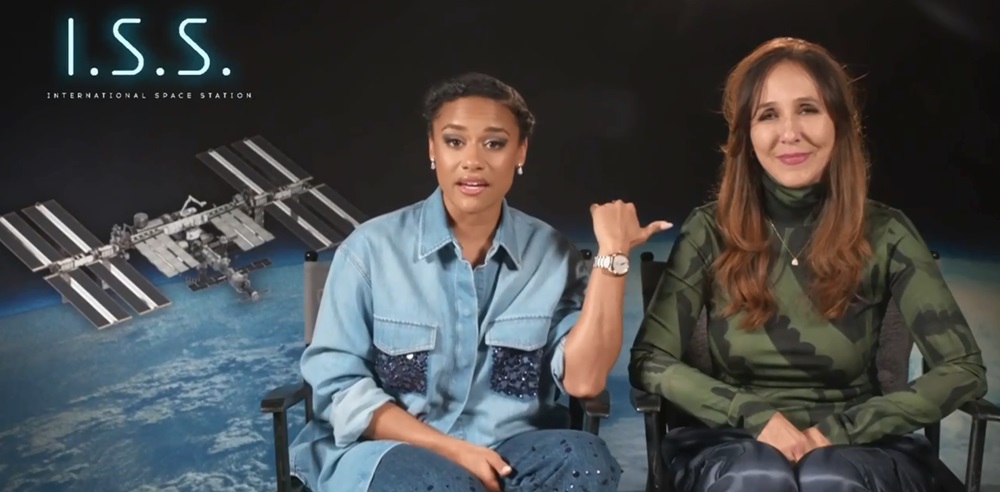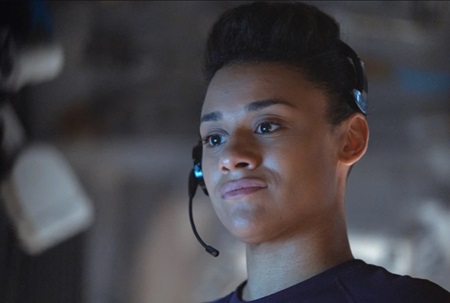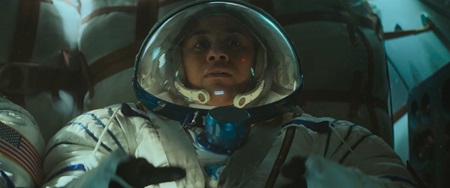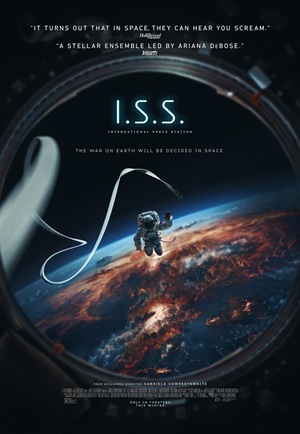
“I.S.S.” – Interview with Ariana DeBose and Gabriela Cowperthwaite
by Sara Michelle Fetters - January 26th, 2024 - Features Interviews
Preserving Hope
Oscar winner Ariana DeBose and director Gabriela Cowperthwaite blur the lines between science fiction and science fact with the timely I.S.S.
I.S.S. is as timely a science fiction thriller as they come. Aboard the International Space Station (I.S.S.), six astronauts — three from the United States, three from Russia — look out the observation window and see an Earth bursting into flame. Seconds later, each trio’s commanding officers receive almost identical messages from their respective governments: take control of the I.S.S. by any means necessary.
Fresh off of making West Side Story (but before she won an Academy Award for Best Supporting Actress for her scene-stealing performance as the fiery Anita), Ariana DeBose tackled the lead role of American astronaut Dr. Kira Foster. “I wanted to do something that was just so vastly different from anything I’d ever done,” she stated candidly. “I saw a little bit of myself [in the character], and I thought that the script was so compelling.
“These are a group of people united by their love of science and their reverence for the cosmos, and no matter their cultural differences, they still have that, and they do form this trust. But then the tables turn, and you have to [ask] the question: How far can you take this bond? What are the thresholds of trust? Where does it start? Where does it end? I thought that would be a really cool thing to explore.”
Award-winning Blackfish and Megan Leavey filmmaker Gabriela Cowperthwaite was attracted to the motion picture for many of the same reasons. “I loved the humanity of it,” she said, referring to writer Nick Shafir’s original screenplay. “It’s a human story [with] real people. It has that sort of authenticity that I wanted to bring to a genre … a lot of [which] has to do with completely suspending to your imagination, suspending reality and going somewhere else. I wanted to take reality and bring it somewhere cool.”
It was after principal photography had ended and during the editing process that Russia invaded Ukraine and the real world violently intruded on the director’s fictional one.
“We had a finished movie and were waiting on the visual effects when [the war in Ukraine] happened,” Cowperthwaite remarked. “I remember having a talk with my producer, Mickey Liddell, and he was like, ‘I don’t even know if we can put this out. How do we put this movie out right now? The world is so fraught. Are we saying the right things?’
“What I told Mickey — and I think is that it’s sort of like the heart and the soul of the piece — is that this is about the little people bearing the brunt of these big national decisions and these big international conflicts… and you’re seeing that distilled with these six astronauts. So, we went forward, but it was still a strange, existential parallel how that kind of unfolded.”
For DeBose, working on I.S.S. was unlike any other on-set experience she’d had up to that point. “It was liberating and extremely challenging,” she said with a smile. “This character, she sort of lives and dies by her specificity. She’s very science-brain, which is not me. I’m like emotional-art, passion-art … brain, so I had to focus in on that.
“But there was a certain kind of physicality that she required as well, and that is a strength of mine. Figuring out how to operate in these harnesses [to simulate weightlessness], I was able to look at that aspect of the work like choreography. Ultimately, it was really, really fun.’
“I’m just now really realizing,” DeBose added after a brief chuckle, “[that] this was the first time that I was sort of spearheading a group of people. I hadn’t done that yet. It was a really good learning experience in … how to show up and be present for my cast in a slightly different way.”
As for the on-screen action, “A lot of what you see happening both physically, emotionally, and within the plot, you’re getting to know these characters through [Kira’s] eyes,” DeBose said.
“This was important. We were under these claustrophobic-heavy circumstances, literally on top of one another. What was great about the harnesses is, at least for myself, I was able to take the feeling and the emotion, the sensation of being in it, and infuse that into the performance. It was very helpful.
“I do think working in such close quarters with all of these other elements that you have to balance at all times… brought us closer together.”
“This is a human story,” De Bose continued. “This is really about the people. And shooting during the pandemic, we [the cast] were forced to be a pod on set and also in this small, very accurate replica — or as close as we could get to accurate — of the I.S.S. We spent a lot of time together.
“I’ve learned so much from Costa Ronin and Masha Mashkova about what it is to be a part of Russian culture. They would share things with me things that made me consider how I relate as Ariana to their culture, to the Russian people, that I had never had to consider before. That helped me ask bigger questions of myself, and of my character, about how I relate to culture in general.
“I think this was one of those art-imitating-life moments where you just couldn’t help but be that close to a person and love all their flaws. I was clinging, literally clinging, to the other actors in simulated zero gravity, right? They were all I had.”
Cowperthwaite hopes audiences ponder themes and ideas similar to those DeBose mentions as they exit the theater. “For me personally, my hopes, my fears, my children, everything I love is only preserved and cared for if I am also caring and preserving somebody else’s hopes, dreams, and families,” said the director with introspective resolve.
“It’s exactly what doesn’t happen in conflict stuff like this. It’s usually like, my security totally depends on you being insecure, and me having more means you have less. It’s true [that] that’s sometimes how the world’s structured, and what we’re seeing right now is sadly a lot of that. But I feel like it should be the opposite. The long game is that I’m only as good and safe as I make you feel … good and safe. That’s what I hope happens, what audiences [talk] about. Or, at least hopefully kind of tracks a tiny bit with that.”
“I think it’s such a strong statement,” DeBose immediately added. “I think the film asks the viewer to consider some crazy circumstances, and the hope is that we don’t get to that moment. When I watched the film, I asked myself, ‘I just went on this ride. Now what can I do to keep us from getting to that moment?’ Whatever the answer, I wanted to go back into the world and try to do that, wanted to keep us from getting to that moment, if that makes sense. I hope audiences will think about doing something similar.”
– Interview reprinted courtesy of the SGN in Seattle






